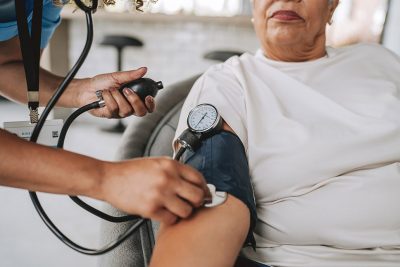
Systolic Blood Pressure Targets in Octogenarians
May 1, 2025
By Michael H. Crawford, MD, Editor
Synopsis: An analysis of a U.S. national database of patients 80 years of age or older taking antihypertensive agents was analyzed to determine the optimal systolic blood pressure associated with the lowest cardiovascular mortality and found that the ideal target was < 130 mmHg.
Source: Yang H, Huang C, Sawano M, et al. Systolic blood pressure and cardiovascular mortality in U.S. adults aged 80+ taking antihypertensive medications. J Am Coll Cardiol. 2025;85(13):1455-1458.
Despite several randomized trials and observational studies, the optimal blood pressure (BP) targets for those 80 years of age or older remain uncertain. Thus, this group from the Center for Outcomes Research and Evaluation at Yale University leveraged the National Health and Nutrition Examination Survey (NHANES) data from 1988 through 2014 linked to the National Death Index through 2019 to evaluate the association between the level of systolic blood pressure (SBP) and cardiovascular mortality (CVM) in subjects aged 80 years or older taking antihypertensive agents.
The mean of the second and third BP measurements was used for this analysis. The primary outcome was CVM, which included codes for heart disease and cerebrovascular disease. Also, SBP was categorized into three groups: < 130 mmHg, 130 mmHg to 160 mmHg, and > 160 mmHg. The statistical model was adjusted for sex, ethnicity, education level, smoking status, frailty, and relevant comorbidities. There were 1,593 subjects identified (60% women).
During a 6.7-year follow-up, there were 1,295 deaths, of which 46% were CVM. Lower SBP was associated with a lower risk of CVM (P < 0.001). Also, CVM was significantly lower at SBP levels < 131 mmHg and significantly higher risk at SBP > 145 mmHg. Those with an SBP < 130 mmHg had a significantly lower risk of CVM than those with an SBP of 130 mmHg to 160 mmHg on multivariable analysis (hazard ratio [HR], 0.74; 95% confidence interval [CI], 0.57 to 0.96). This difference persisted after excluding those who died within a year or five years and those deemed frail.
However, SBP < 131 mmHg was not significantly different than 131 mmHg to 145 mmHg (HR, 0.81; 95% CI, 0.60 to 1.09) but was significantly lower than an SBP > 145 mmHg (HR, 0.65; 95% CI, 0.50 to 0.85). The authors concluded that lower SBP is associated with lower mortality in those 80 years of age or older taking antihypertensive medications and supports guideline recommendations for intensive SBP control in this age group.
Commentary
The evidence regarding optimal BP targets for adults aged > 80 years is limited and inconsistent. Major randomized controlled trials (RCTs) have excluded individuals aged > 80 years (e.g., the Strategy of Blood Pressure Intervention in the Elderly Hypertensive Patients [STEP] trial) or failed to analyze this age group separately (e.g., the Effects of Intensive Systolic Blood Pressure Lower Treatment in Reducing Risk of Vascular Events [ESPRIT] trial) or had insufficient CVM because of a short follow-up duration (e.g., the Hypertension in the Very Elderly [HYVET] trial). Observational studies have shown conflicting results, with evidence that intensive BP control may not always be beneficial in this age group. However, guidelines generally have recommended more intensive BP control in this age group. Thus, this observational study of NHANES data is of interest.
All the patients in the Yang et al study were taking antihypertensive therapy and after an almost seven-year average follow-up, CVM was 46% of the mortality observed. However, if SBP was < 130 mmHg, survival was significantly increased, which supports rigorous management of SBP in those > 80 years of age.
There are limitations to the Yang study. Since it is observational, causal inference cannot be made and there may be residual confounding factors, such as medication adherence. Also, BP was measured once at intake and there are no data on long-term variability. In addition, medication changes during follow-up were not assessed. Finally, the potential complications of intensive BP lowering, such as hypotension, falls, and hip fractures, were not addressed. Thus, aggressive management of BP in those > 80 years of age is desirable, but the overall health and safety of the patients must be considered as well.
Michael H. Crawford, MD, is Professor Emeritus of Medicine and Consulting Cardiologist, UCSF Health, San Francisco.